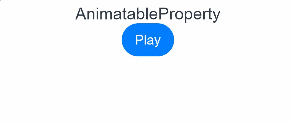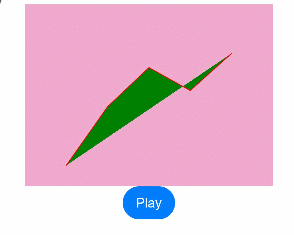harmony 鸿蒙\@AnimatableExtend Decorator: Definition of Animatable Attributes
\@AnimatableExtend Decorator: Definition of Animatable Attributes
The @AnimatableExtend decorator is used to define an attribute method for animating a non-animatable attribute of a component. During animation execution, the frame-by-frame callback is used to change the value of the non-animatable attribute so that an animation effect can be applied to the attribute.
Animatable attribute: If an attribute method is called before the animation attribute, and changing the value of this attribute can make the animation effect specified by the animation attribute take effect, then this attribute is called animatable attribute. Examples of animatable attributes are height, width, backgroundColor, and translate.
Non-animatable attribute: If an attribute method is called before the animation attribute, and changing the value of this attribute cannot make the animation effect specified by the animation attribute take effect, then this attribute is called non-animatable attribute. Examples of non-animatable attributes are fontSize of the <Text> component and points of the <Polyline> component.
NOTE
This decorator is supported since API version 10. Updates will be marked with a superscript to indicate their earliest API version.
Rules of Use
Syntax
@AnimatableExtend(UIComponentName) function functionName(value: typeName) {
.propertyName(value)
}
- \@AnimatableExtend can be defined only globally.
- The parameter of the \@AnimatableExtend decorated function must be of the number type or a custom type that implements the AnimtableArithmetic<T> API.
- In the \@AnimatableExtend decorated function body, only the attribute methods of the component specified in brackets immediately following \@AnimatableExtend can be called.
AnimtableArithmetic<T> Description
To perform animation on complex data types, you must implement the addition, subtraction, multiplication, and equivalence judgment functions in the AnimtableArithmetic<T> API. |Name|Input Parameter Type|Return Value Type|Description| |——–|——–|——–|——–| |plus|AnimtableArithmetic<T>|AnimtableArithmetic<T>|Addition function.| |subtract|AnimtableArithmetic<T>|AnimtableArithmetic<T>|Subtraction function.| |multiply|number|AnimtableArithmetic<T>|Multiplication function.| |equals|AnimtableArithmetic<T>|boolean|Equivalence judgment function.|
Example
The following example applies an animation to the font size attribute.
@AnimatableExtend(Text) function animatableFontSize(size: number) {
.fontSize(size)
}
@Entry
@Component
struct AnimatablePropertyExample {
@State fontSize: number = 20
build() {
Column() {
Text("AnimatableProperty")
.animatableFontSize(this.fontSize)
.animation({duration: 1000, curve: "ease"})
Button("Play")
.onClick(() => {
this.fontSize = this.fontSize == 20 ? 36 : 20
})
}.width("100%")
.padding(10)
}
}

The following example implements a polyline animation effect.
class Point {
x: number
y: number
constructor(x: number, y: number) {
this.x = x
this.y = y
}
plus(rhs: Point): Point {
return new Point(this.x + rhs.x, this.y + rhs.y)
}
subtract(rhs: Point): Point {
return new Point(this.x - rhs.x, this.y - rhs.y)
}
multiply(scale: number): Point {
return new Point(this.x * scale, this.y * scale)
}
equals(rhs: Point): boolean {
return this.x === rhs.x && this.y === rhs.y
}
}
class PointVector extends Array<Point> implements AnimatableArithmetic<PointVector> {
constructor(value: Array<Point>) {
super();
value.forEach(p => this.push(p))
}
plus(rhs: PointVector): PointVector {
let result = new PointVector([])
const len = Math.min(this.length, rhs.length)
for (let i = 0; i < len; i++) {
result.push((this as Array<Point>)[i].plus((rhs as Array<Point>)[i]))
}
return result
}
subtract(rhs: PointVector): PointVector {
let result = new PointVector([])
const len = Math.min(this.length, rhs.length)
for (let i = 0; i < len; i++) {
result.push((this as Array<Point>)[i].subtract((rhs as Array<Point>)[i]))
}
return result
}
multiply(scale: number): PointVector {
let result = new PointVector([])
for (let i = 0; i < this.length; i++) {
result.push((this as Array<Point>)[i].multiply(scale))
}
return result
}
equals(rhs: PointVector): boolean {
if (this.length != rhs.length) {
return false
}
for (let i = 0; i < this.length; i++) {
if (!(this as Array<Point>)[i].equals((rhs as Array<Point>)[i])) {
return false
}
}
return true
}
get(): Array<Object[]> {
let result: Array<Object[]> = []
this.forEach(p => result.push([p.x, p.y]))
return result
}
}
@AnimatableExtend(Polyline) function animatablePoints(points: PointVector) {
.points(points.get())
}
@Entry
@Component
struct AnimatablePropertyExample {
@State points: PointVector = new PointVector([
new Point(50, Math.random() * 200),
new Point(100, Math.random() * 200),
new Point(150, Math.random() * 200),
new Point(200, Math.random() * 200),
new Point(250, Math.random() * 200),
])
build() {
Column() {
Polyline()
.animatablePoints(this.points)
.animation({duration: 1000, curve: "ease"})
.size({height:220, width:300})
.fill(Color.Green)
.stroke(Color.Red)
.backgroundColor('#eeaacc')
Button("Play")
.onClick(() => {
this.points = new PointVector([
new Point(50, Math.random() * 200),
new Point(100, Math.random() * 200),
new Point(150, Math.random() * 200),
new Point(200, Math.random() * 200),
new Point(250, Math.random() * 200),
])
})
}.width("100%")
.padding(10)
}
}

你可能感兴趣的鸿蒙文章
harmony 鸿蒙app.json5 Configuration File
harmony 鸿蒙Internal Structure of the app Tag
harmony 鸿蒙Application Configuration File Overview (FA Model)
harmony 鸿蒙Application Configuration File Overview (Stage Model)
harmony 鸿蒙Application Installation and Uninstallation Process
harmony 鸿蒙Application Package Overview
harmony 鸿蒙Application Package Structure in FA Model
- 所属分类: 后端技术
- 本文标签: